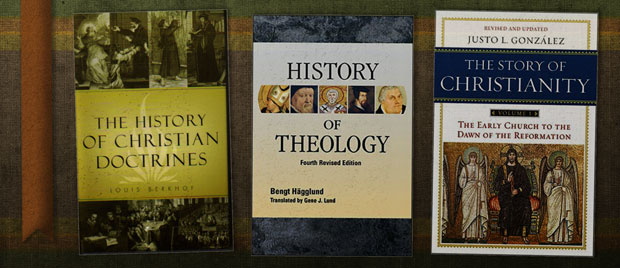Introduction
There are three problems with the modern world and our relationship with history. The first is that we misrepresent the past to suit our narratives and modern causes. The second is that we refuse to learn from history. We have all heard the famous statement that the one thing we learn from history is that we learn nothing from history. The third is that we are increasingly detaching ourselves from history.
Since believers in the 21st century live within this present culture, we tend to face the same problems in our relationship with the history of Christianity. Some will misrepresent some phases in church history to suit their agendas. Those who pay attention to history do not learn from it. This explains why we see churches and church leaders take the same steps that church history has shown us to be destructive.
However, I believe the biggest problem is that we detach ourselves from church history. In many church traditions, especially those who have developed in the last century, there is little or no regard for the preceding 1900 years of church history. Many people grow up in our churches who do not know Martin Luther, John Calvin, Erasmus, and Thomas Aquinas talk less of Origen, Augustine, or Irenaeus.
My contention is that we are the worse for it.

Two Thousand Years of God’s Faithfulness
A Faithful God
God has always dealt with man through covenants. For every covenant God makes, there is a promise. In the Noahic covenant, he promised that he will never again destroy the world by the waters of a flood (Genesis 6:11). In the Abrahamic covenant, he promised to make Abraham a great nation, bless him, make his name great, and make him a blessing so that all the peoples of the earth will be blessed through him (Genesis 12:1-3).
In the Mosaic covenant, he promised that Israel would be his treasured possession, a kingdom of priests, and a holy nation (Exodus 19:6). In the Davidic covenant, he promised that a man will not be absent on David’s throne (2 Samuel 7). In the New Covenant, he promised to put his laws in our minds, write it on our hearts, be our God and we his people, forgive our iniquities, and be in a personal relationship with every member of the covenant.
The recurring theme of Scriptures is that God is faithful. The only hope of man is that God is faithful to his promises. The reason why seedtime and harvest time remains and a flood of waters has not destroyed the earth is that God is faithful to his promises.
Daniel acknowledged that God is faithful to his covenant promises (Daniel 9:4); Israel is the unfaithful partner (9:5-19). Moses reminded Israel that God keeps his covenant of love to a thousand generations of those who love him (Deuteronomy 7:9). His faithfulness is great (Lamentations 3:23) and it reaches to the skies (Psalms 36:5).
God’s Faithful and the Christian Life
God’s faithfulness is the strength of our hope. We can keep doing good even when we suffer because we serve a faithful creator (1 Peter 4:19). We can hold unswervingly to the hope we profess because we know that the one who promises is faithful (Hebrews 10:23). We can be confident that the evil one will not triumph because God is faithful and he will keep us (2 Thessalonians 3:3). We are confident that our faith will last to the end because God is faithful (1 Corinthians 1:9).
The courage to live the Christian life comes from our conviction of God’s faithfulness. Our faithfulness to the stipulations of the covenant depends on our conviction that God is faithful. Abraham was able to trust God in the trying moments of bareness because he knew that God is faithful (Hebrews 11:11). His confidence in God’s faithfulness made him to live in tents as a stranger in a foreign country (11:8-10).
God knows the importance of our trust in his faithfulness. This is why he swore by himself to Abraham (Hebrews 6:13). Now “by two unchangeable things in which it is impossible for God to lie, we who have fled to take hold of the hope offered to us may be greatly encouraged” (6:18).
What will help us remain faithful to God amidst afflictions? What will make us hold firm when everything around is crashing down? Why will we stand with God when the whole world is going after the beast? Why will we obey God when it brings us losses? Why will we live counter cultural lives in this world? What will make us fix our gaze on heaven when everyone around is earthly minded?
Faith and hope are two of the reasons. We remain faithful in afflictions because we have God’s promise that he is with us in our afflictions, working it out for our good (Romans 8:28, Isaiah 43:2). We don’t envy the success of sinners or decry our losses in the path of faithfulness because there is a future hope for us (Proverbs 23:18) and the evil man has no future hope (Proverbs 24:19)
How do we grow in faith and hope? It is by an increasing conviction that God is faithful to his promises and none of it will go unfulfilled.
God’s Faithfulness and the Past
One way that Paul encouraged the faith and hope of the Roman believers is to point them to what was “written in the past.” In Romans 15:4, he said, “everything that was written in the past was written to teach us, so that through endurance and the encouragement of the scriptures we may have hope.”
The history of God’s faithfulness in the past nurtures our faith in the present. This theme of deriving present faith and hope from God’s past faithfulness is a major one in Psalms 76 and following.
While we can remember God’s faithfulness in the past in our personal lives to encourage our faith and hope today, the focus of Paul in Romans 15 is God’s acts of faithfulness in redemptive history.
For us who are believers today, we have access to both God’s faithfulness in the canonized (Old Testament and New Testament) history of his dealing with his people as well as the two thousand years of the Christian church.
We have access to two thousand years of the spread of the gospel to nations, tongues, languages, and people so that we can be encouraged when we face difficulties in our mission work today. We have records of how God preserves the church when it seems the tide of worldliness will sweep it away so that we can be encouraged that the gates of hell will not prevail against the church (Mathew 16:18). The two thousand years of church history is a testimony to God’s faithfulness to keep the church pure amidst persecutions and tribulations so that we can have courage when we face those persecutions today.
Nothing that threatens the existence of the church or its ability to fulfil its commission is entirely new. It may be new in its manifestation but not in its essence. The history of God’s faithfulness in the past 2000 years gives us courage to forge ahead.
The past two thousand years is also the history of God’s faithfulness in the lives of individuals. We have seen people who trusted God doing exploits. We have seen how God keeps his own amid tribulations. We have a large record of God’s faithfulness over the years.
By drawing from these records of God’s faithfulness, we strengthen our faith and hope, which helps us to live faithful Christian lives in the present.

Two Thousand Years of Godliness
When we face some temptations in the Christian journey, there is a temptation to think we are all alone in this. Paul needed to remind the Corinthians that their case is not different (1 Corinthians 10:13).
Some of us justify our unfaithfulness to God in this modern world by thinking that our temptations are unique. In our minds we think, “Christians of past ages never struggled with devotions since they had no phone to distract them.” Some of us will even doubt that Jesus was actually tempted just as we are in all things. (Hebrews 4:15)
The temptations may manifest in different ways but the essence of the temptations is the same. Christians of previous centuries struggled with the same sins that we struggle with today. Their pornography may consist in looking at another man’s wife bathing in the next house but the temptation to lust and sexual immorality was not less inviting. Christians who grew up in Rome needed the same self-control we need in today’s world.
The avenues through which the temptations come may change but if we are reading our bibles correctly, we should know that the heart is the issue (Mathew 15:19, James 1:13-15). Technology is not our problem; the evil desires in our heart are the culprit.
Similarly, did God not promise to provide a way of escape for every temptation? (1 Corinthians 10:13). Even if we can claim that our case is different (it is not), the promise of God is to provide a way of escape for every temptation (whether in the 5th or 21st century).
Instead of whining about the temptations to godliness and faithfulness we face, we can learn from two thousand years of believers who have lived godly lives amidst temptations to worldliness and unfaithfulness.
Christians have lived faithful and godly lives even when developments in the world threatened the very existence of Christianity. Christians lived faithfully during the enlightment and the anti-God worldviews that came from that period. Christians lived faithfully amid crass paganism and sexual immorality in Asia Minor and Rome.
Their stories and experiences should encourage us as we face the different manifestations of the same root of temptation and sin in our generation. We must learn from the diverse experiences of believers in these two thousand years.
We also learn from their positive godliness and righteousness. In those two thousand years, we have manifestations of Christian devotion and God-centeredness that can encourage our faith in the present.
The writer of Hebrews encouraged the church he was writing to by pointing to the faithfulness of the Old Testament saints (Hebrews 12:1-5). The great cloud of witnesses surrounding them should encourage them to ‘throw off everything that hinders and the sin that so easily entangles,” and “run with perseverance” the race that is set before them.
For us in 2020, the cloud of witnesses have multiplied in many folds. The manifestations of temptation and sin may differ in today’s world but the essence is the same. Furthermore, the means of grace by which we overcome the temptations are the same – prayer, the word of God, and communion with the saints, among others.
Two Thousand Years of Christian Courage
The faithfulness of those who have gone before us extends to the courage with which they stood for their Christian convictions. In our post-modern world, we have choices but no conviction. We hardly stand for anything. We flow with the current narrative and the trendy movements.
Our Christian convictions are so fuzzy that we only need some few people to unfriend us on social media to bulge. We will deny clear biblical teachings and follow worldly patterns even when no one points a sword at us. They only need to threaten to de-platform us.
The two thousand years of church history will show us people who laid their lives down for the truths they believe. They went to the gallows even in the hands of other professed Christians because they were people with convictions. Their love for God and his word trumped their love for fame, popularity, and life itself.
Through trials, tribulations, and persecutions, they remained steadfast. They knew that neither life nor death could separate them from the love of God and they were not afraid to drown with a hymn of praise in their mouths or to burn with hallelujahs on their lips.
Let us learn from their courage to remain faithful to God and his word irrespective of the threats. Let us learn to defy the world and its ruler (the devil) and be brave and bold for the gospel that we profess. Their faith should help take a bold stand against the theological liberalism, anti-God ideologies, and worldly drifts that characterize our culture.

Two Thousand Years of Theology
Many people do theology today as if God skipped one thousand nine hundred years of Church history and he began to dispense his truth in the 1900s. Worse still, some do theology as if the church is only as old as the lifetime of their general overseer/founder.
Many will even insist that they have discovered some new truths in scriptures that was hidden from the church through all those centuries. They then insist that such ‘truths’ are salvific.
When you approach any text of scriptures and no one in the history of the church ever thought about that interpretation in your head, it is probably the wrong one. There is an increasing desire for novelty in theology that may lead us away from the faith once for all delivered to the saints (Jude 3).
This is not to say that there were not times in the history of the church when a large section of the church lost sight of a biblical truth. That is exactly the point – they lost sight of it. For example, the reformation did not discover the truth of justification by faith alone; it recovered it.
The church can grow in its understanding of a particular theological point in a way that previous centuries did not. However, that is not a discovery of something novel but a building on the work of past theologians (things new and old – Mathew 13:52). Theologians today may come to conclusions that are different from their predecessors but such conclusions draws from and improves upon the conclusions of the theologians of the past. We may come to a better understanding of a theological point but it can never be separate from the work that others have done before us.
We cannot ignore the continuity in the work of theology. God has been working in his church for two thousand years to help us come to a true knowledge of his word and his will. An approach to theology that ignores the work of God across the ages and seeks out endless novelty is mistaken.
Before we stand up from our study to proclaim our new discoveries, we need to consider the history of interpretation of that text or passage carefully, seeking to understand how the people of God in the past have understood it.
You may have good reasons to hold still to your new discovery but you do so with more carefulness and thoughtfulness.
None of this is to say that we must do theology with the mindset that the older is always better. The point is that we must pay attention to the works that others have done throughout the church age. Doing so will make us more humble and thoughtful. At the end, we will become better theologians for it.

Conclusion
This is not a call to idolize the past and demonize the present. The history of the church is full of some bad episodes. It is a reminder of the power of indwelling sin.
Rather, the call is for us to pay more attention to the two thousand years of church history. In those centuries, there are important lessons of God’s faithfulness and Christian faithfulness that we can learn. The bad episodes also provide learning opportunities. Our knowledge of those bad episodes should help us avoid the pitfalls of our fathers and mothers in the faith.
Paying more attention to church history will lead to remarkable growth in our Christian lives as individuals and church communities.
When we stand with the lamb on Mount Zion (Revelation 14:1), we will stand with the community of the redeemed of all ages (14:3). It will be generations of faithful Christians who served a faithful God. While we await that time, the present generation must improve their faith and hope by studying the history of those who have gone before.



